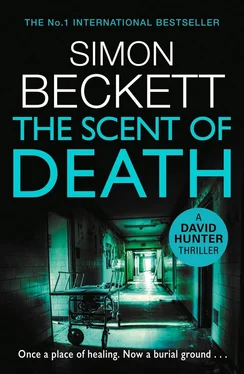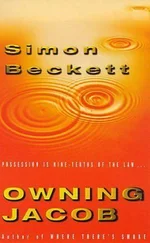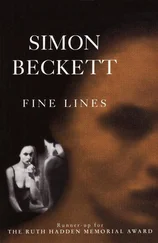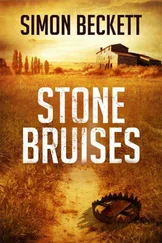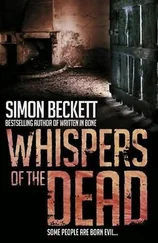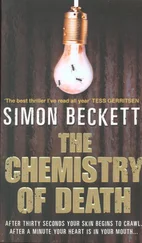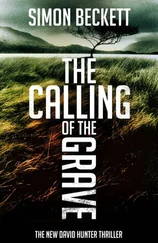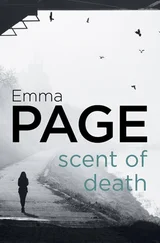‘Thanks,’ I said, meaning it. It would have been easier for her to have gone with a private company, especially if there’d been pressure from above. Suddenly, Commander Ainsley’s enthusiasm for me to join the private sector didn’t seem quite so coincidental.
Ward shrugged it off. ‘They’re an unknown quantity, and I’ve worked with you before. Just don’t balls it up.’
She didn’t sound like she was entirely joking. ‘Who’s their forensic anthropologist?’
‘Daniel Mears. Comes very highly rated. A real perfectionist, by all accounts. Do you know him?’
I shook my head: the name meant nothing to me. ‘Where’s he based?’
‘Not sure, but you can ask him yourself.’ She nodded towards the BioGen vans. ‘This is him now.’
A young technician and an older man were walking towards the hospital steps. Their coveralls were the same grey as the vans and bore the BioGen logo on the chest. Their hoods were down at the moment, revealing that the older of the pair was about fifty, tall with aquiline features and a shaved head. I was surprised I’d never heard of him before. Forensics had exploded in the last few years, with newly qualified graduates in all its disciplines flooding the market. But this was an older individual, and if he’d been around for any length of time I’d have expected to have come across him.
‘Hello, Dr Mears,’ Ward said. ‘This is David Hunter. He’s been working on the other half of this investigation.’
I was on the verge of offering my hand, but the newcomer didn’t stop. ‘See you up there,’ he said to the young technician, and carried on walking.
The younger man had halted in front of us. Realizing my mistake, I tried to recover from my gaffe. And my surprise. God, how old is he? Mears must have been in his mid- or late-twenties at least, but he didn’t look it. Fresh-faced, he had flaming red hair and a complexion to match, milky skin dotted with freckles that made him seem even younger. He was carrying an aluminium flight case similar to mine. It wasn’t a standard piece of kit, but I knew one or two other people in my line of work who had them. The lightweight aluminium was tough and waterproof, protecting my camera, laptop and various other pieces of equipment I carried around with me. But whereas my case was battered and scuffed from years of use, the one Mears had was as pristine as everything else about him. In his fresh grey overalls, he put me in mind of nothing so much as a schoolboy decked out for the first day of term.
Ward had said he came highly recommended, though. He must be, or he wouldn’t be here.
‘Dr Hunter,’ he said stiffly. His voice was unexpectedly deep, as though to compensate for his youthful appearance. The pale cheeks had darkened in a flush that told me my slip hadn’t gone unnoticed. ‘I read one of your papers on decomposition a couple of years back. Interesting.’
I wasn’t sure how to take that, but let it go. ‘Always good to meet another forensic anthropologist.’
‘Actually, I’m a forensic taphonomist.’
‘Oh. Right.’
Ward had got his job title wrong, but it was an understandable mistake. In a basic sense, taphonomy was the study of the processes a biological organism undergoes after death, up to its eventual fossilization. In a forensic context that meant looking at any and all post-mortem changes to a human body, from decomposition to trauma. It encompassed a broad range of forensic disciplines, but there was nothing particularly new about it. In a lot of respects, it was only what I already did myself.
Yet I wouldn’t have called myself a forensic taphonomist and, while I was aware of a few people who did, it was more common in the US than the UK. Still, earlier in my career I’d experienced bias myself from more established experts who didn’t like the idea of change. I’d no intention of becoming one of them.
‘So is your background anthropological or archaeological?’ I asked.
‘Both. I take a broad-spectrum approach, including palaeontology and entomology,’ he said, snapping a skin-tight glove into place by way of emphasis. They were the same steel grey as his coveralls: BioGen obviously took their corporate image very seriously. ‘The old single-disciplinary approach had its time, but it’s outdated now. Forensics has moved on. You need to be able to bring a wide range of skills to the table.’
‘I thought I did,’ I said lightly.
He smiled to himself. ‘Really.’
Now there was no mistaking the implied put-down. Ward was frowning as she looked at us.
‘Well, I’ll leave the two of you to it.’
She headed towards the police trailer. Mears and I regarded each other. I was struck again by how young he looked. Give him a chance . He might be just nervous and overcompensating.
‘Have you been inside yet?’ I asked, nodding at the blackened walls of St Jude’s.
Mears’s blush had faded, but the faintly supercilious air remained. ‘Not yet.’
‘It’s pretty grim. They’ve just finished opening the walled-up chamber in the paediatric ward. I’ll be interested to hear what you make of it.’
‘You’ve been in there?’
‘Only just inside the false wall.’
That wasn’t strictly true. I’d gone down into the chamber to help Conrad, but I didn’t think there was any point mentioning that. Something told me Mears would be territorial, and we’d started off badly enough as it was.
‘Really?’ Colour was flooding back to his cheeks. ‘I know we’re supposed to extend professional courtesy to each other, so I won’t make a formal complaint this time. But I’d appreciate it in future if you’d stay out of my crime scene.’
I was too surprised to speak. The only reason I’d been there in the first place was because no one told me I’d been replaced.
‘Technically, I think it’s DCI Ward’s crime scene,’ I said, trying not to lose my temper. ‘But don’t worry, I’ve no reason to go in again. It’s all yours.’
‘Good. In that case we won’t have any problem.’
He brushed past me. The back of his neck was red as his hair as he carried his shiny flight case up the steps.
Then the Gothic entrance of the hospital swallowed him into its dark maw.
I was still fuming as I went back to my car. Mears might look young, but he wasn’t lacking in ego. Or nerve. I’d come across more than a few prima donnas in my work, but the forensic taphonomist came close to the top of the list. I wasn’t impressed with Ainsley either, patronizingly offering me career advice after instigating my removal from the investigation. Or this part of it, anyway. And while I didn’t blame Ward for what had happened, she should have told me sooner. Not let me wander into a crime scene believing I was going to be working on it.
Feeling aggrieved and hard done by, I wrenched on the zip of my coveralls as I made my way through the parked police vehicles. It was only when I was nearly at my car that I realized I’d gone past the bins left out for discarded coveralls.
Wonderful . But the slip was enough to puncture my sulk. As I turned around and walked back the air began to leak out of my indignation. There were bigger things at stake here than pride, I reminded myself, looking up at the austere walls of St Jude’s. At this time of day the sun was behind the old hospital, casting its shadow across the car park. When I stepped into it there was a noticeable drop in temperature, as though the hospital’s dank atmosphere extended even out here. I didn’t want to imagine what it must have been like for the two victims I’d seen, strapped to the beds inside a sealed room. The memory of that scene swept away the last of my self-pity. It was hard to say how long their bodies had been there, left to die and decay in the cold darkness. But in those conditions — dry with a cool, constant temperature, insulated from even the summer heat — it would have been months. Perhaps even years, because once the decomposition was in its final stages a sort of stasis would be reached, the remaining physical changes slowing down and down until they were almost imperceptible.
Читать дальше
